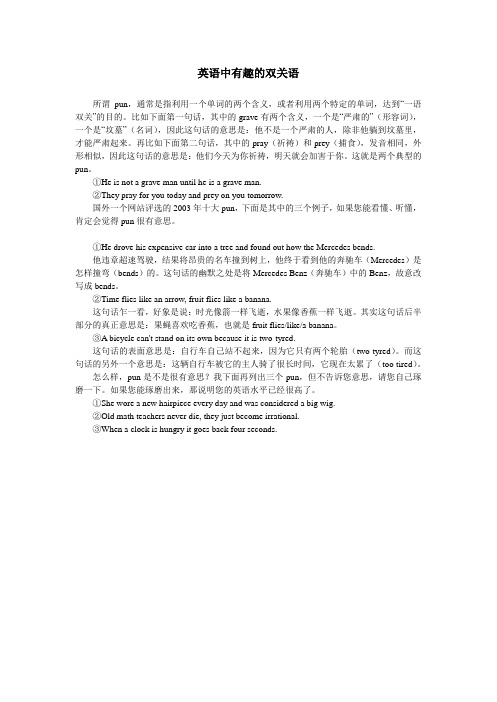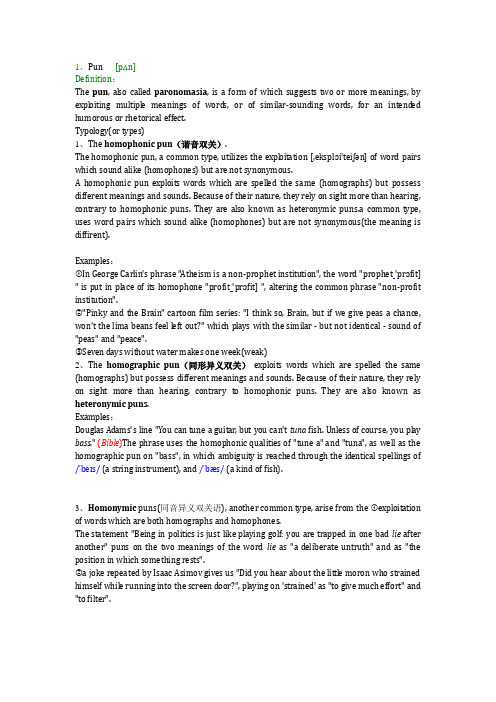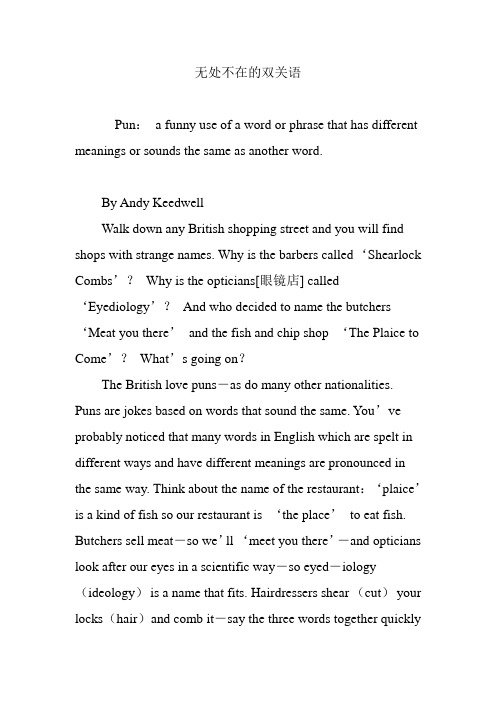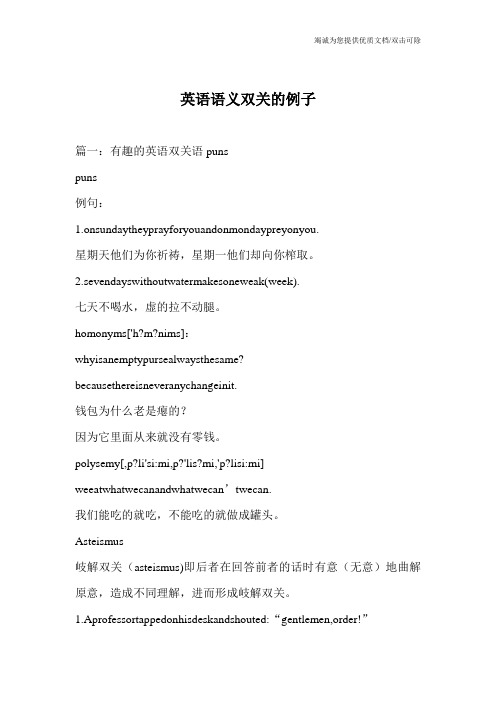有趣的英语双关语Puns
英语中有趣的双关语

英语中有趣的双关语所谓pun,通常是指利用一个单词的两个含义,或者利用两个特定的单词,达到“一语双关”的目的。
比如下面第一句话,其中的grave有两个含义,一个是“严肃的”(形容词),一个是“坟墓”(名词),因此这句话的意思是:他不是一个严肃的人,除非他躺到坟墓里,才能严肃起来。
再比如下面第二句话,其中的pray(祈祷)和prey(捕食),发音相同,外形相似,因此这句话的意思是:他们今天为你祈祷,明天就会加害于你。
这就是两个典型的pun。
①He is not a grave man until he is a grave man.②They pray for you today and prey on you tomorrow.国外一个网站评选的2003年十大pun,下面是其中的三个例子,如果您能看懂、听懂,肯定会觉得pun很有意思。
①He drove his expensive car into a tree and found out how the Mercedes bends.他违章超速驾驶,结果将昂贵的名车撞到树上,他终于看到他的奔驰车(Mercedes)是怎样撞弯(bends)的。
这句话的幽默之处是将Mercedes Benz(奔驰车)中的Benz,故意改写成bends。
②Time flies like an arrow, fruit flies like a banana.这句话乍一看,好象是说:时光像箭一样飞逝,水果像香蕉一样飞逝。
其实这句话后半部分的真正意思是:果蝇喜欢吃香蕉,也就是fruit flies/like/a banana。
③A bicycle can't stand on its own because it is two-tyred.这句话的表面意思是:自行车自己站不起来,因为它只有两个轮胎(two-tyred)。
而这句话的另外一个意思是:这辆自行车被它的主人骑了很长时间,它现在太累了(too tired)。
英语修辞之双关——Pun

1、Pun[pʌn]Definition:The pun, also called paronomasia, is a form of which suggests two or more meanings, by exploiting multiple meanings of words, or of similar-sounding words, for an intended humorous or rhetorical effect.Typology(or types)1、The homophonic pun(谐音双关).The homophonic pun, a common type, utilizes the exploitation [,eksplɔi'teiʃən] of word pairs which sound alike (homophones) but are not synonymous.A homophonic pun exploits words which are spelled the same (homographs) but possess different meanings and sounds. Because of their nature, they rely on sight more than hearing, contrary to homophonic puns. They are also known as heteronymic puns.a common type, uses word pairs which sound alike (homophones) but are not synonymous(the meaning is diffirent).Examples:①In George Carlin's phrase "Atheism is a non-prophet institution", the word "prophet 'prɔfit] " is put in place of its homophone "profit'prɔfit] ", altering the common phrase "non-profit institution".②"Pinky and the Brain" cartoon film series: "I think so, Brain, but if we give peas a chance, won't the lima beans feel left out?" which plays with the similar - but not identical - sound of "peas" and "peace".③Seven days without water makes one week(weak)2、The homographic pun(同形异义双关)exploits words which are spelled the same (homographs) but possess different meanings and sounds. Because of their nature, they rely on sight more than hearing, contrary to homophonic puns. They are also known as heteronymic puns.Examples:Douglas Adams's line "Y ou can tune a guitar, but you can't tuna fish. Unless of course, you play bass." (Bible)The phrase uses the homophonic qualities of "tune a" and "tuna", as well as the homographic pun on "bass", in which ambiguity is reached through the identical spellings of /ˈbeɪs/ (a string instrument), and /ˈbæs/ (a kind of fish).3、Homonymic puns(同音异义双关语), another common type, arise from the①exploitation of words which are both homographs and homophones.The statement "Being in politics is just like playing golf: you are trapped in one bad lie after another" puns on the two meanings of the word lie as "a deliberate untruth" and as "the position in which something rests".②a joke repeated by Isaac Asimov gives us "Did you hear about the little moron who strained himself while running into the screen door?", playing on 'strained' as "to give much effort" and "to filter".4、compound pun is a statement that contains two or more puns.Examples:①a complex statement by Richard Whately includes four puns: "Why can a man never starve in the Great Desert? Because he can eat the sand which is there. But what brought the sandwiches there? Why, Noah sent Ham, and his descendants mustered and bred."[8]This pun uses "sand which is there/sandwiches there, "Ham/ham", "mustered/mustard", and "bred/bread".5、A recursive pun is one in which the second aspect of a pun relies on the understanding of an element in the first.Examples:① the statement "π is only half a pie." (π radians is 180 degrees, or half a circle, and a pie is a complete circle).②"Infinity(无限大)is not in finity(有限的)," which means infinity is not in finite range.③"A Freudian slip is when you say one thing but mean your mother."[9] Finally, we are given "Immanuel doesn't pun, he Kant(康德)" by Oscar Wilde.6、Visual puns are used in many logos, emblems, insignia, and other graphic symbols, in which one or more of the pun aspects are replaced by a picture. In European heraldry, this technique is called canting arms.Visual and other puns and word games are also common in Dutch gable stones as well as in some cartoons Examples:① Visual and other puns and word games are also common in Dutch gablestones;② In some cartoons such as Lost Consonants and The Far SidePuns in comedies、jokes、literatureIn Romeo and Juliet when Mercutio begs Romeo to dance, Romeo refuses.Unlike Mercutio’s shoes with “nimble soles,” Romeo says that he has a “soul of lead.” At one point, Romeo asks for a torch, saying “being heavy [sad], I will bear the light.”Captain Aubrey: "Do you see those two weevils, Doctor?...Which would you choose?"Dr. Maturin: "Neither. There's not a scrap of difference between them. They're the same species of Curculio."Captain Aubrey: "If you had to choose. If you were forced to make a choice. If there were no other option."Dr. Maturin: "Well, then, if you're going to push me. I would choose the right-hand weevil. It has significant advantage in both length and breadth."Captain Aubrey: "There, I have you!...Do you not know that in the Service, onemust always choose the lesser of two weevils?"Other great works of literature have included puns as well. Poet John Donne, whose name rhymed with “done,” often punned his name in his own poetry. In one of his hymns, he even puns the name of his wife Anne More, with the line “Thou hast not done, For I have more.”Our Bible reveals to us the character of our God with minute andremorseless exactness ... It is perhaps the most damnatorybiography that exists in print anywhere. It makes Nero an angelof light and leading by contrast. [Msark Twain]Falling in love is not at all the most stupid thing that people do —but gravitation can not be held responsible for it. [AlbertEinstein]Prediction is very difficult, especially about the future. [NielsBohr]Essentially, all models are wrong, but some are useful. [George E.P. Box]The best material model of a cat is another, or preferably thesame, cat. [Norbert Wiener]As a child, I received instruction both in the Bible and in theTalmud. I am a Jew, but I am enthralled by the luminous figure ofthe Nazarene. [Albert Einstein]One morning I shot an elephant in my pajamas. How he got intomy pajamas I'll never know. » [Groucho Marx]Puns often are used in the titles of comedic parodies. A parody of a popular song, movie, etc., may be given a title that hints at the title of the work being parodied, substituting some of the words with ones that sound or look similar. Such a title can immediately communicate both that what follows is a parody and also which work is about to be parodied, making any further "setup" (introductory explanation) unnecessary.Examples would include the Star Trek: V oyager episode entitled "False Profits" (a pun on the saying 'false prophets') or the episode of Psych entitled "The Polarizing Express" (spoofing The Polar Express and the definition of polarization, which means 'to break into factions')Non-humorous puns were and are a standard rhetorical and poetic device in English literature. Puns and other forms of word play have been used by many famous writers, such as Alexander Pope, James Joyce, Vladimir Nabokov, Robert Bloch, Lewis Carroll, John Donne, and William Shakespeare, who is estimated to have used over 3,000 puns in his plays.[citation needed]Here is an example from Shakespeare's Richard III:"Now is the winter of our discontent made glorious summer by this son of Y ork"(Son/sun)Shakespeare was also noted for his frequent play with less serious puns, the "quibbles" of the sort that made Samuel Johnson complain, "A quibble is to Shakespeare what luminous vapours are to the traveller! He follows it to all adventures; it is sure to lead him out of his way, sure to engulf him in the mire.It has some malignant power over his mind, and its fascinations areirresistible."[14] Elsewhere, Johnson disparagingly referred to punning as "the lowest form of humour".[citation needed]In the poem A Hymn to God the Father, John Donne, married to Anne More,reportedly puns repeatedly: "Son/sun" in the second quoted line, and twocompound puns on "Donne/done" and "More/more". All three arehomophonic, with the puns on "more" being both homographic andcapitonymic. The ambiguities serve to introduce several possible meanings into the verses."When Thou hast done, Thou hast not done / For I have more.that at my death Thy Son / Shall shine as he shines now, and heretoforeAnd having done that, Thou hast done; / I fear no more."。
英语幽默技巧

英语幽默技巧有:1.双关语(Puns):双关语是一种基于单词或短语的多重含义来产生幽默效果的技巧。
例如,“Why did the chicken cross the road?To get to the other side.” 这个笑话的幽默之处在于“the other side”既可以理解为道路的另一边,也可以理解为生命的另一边(即死亡)。
2.讽刺(Irony):讽刺是一种通过说反话或表达与预期相反的意思来产生幽默的技巧。
例如,“I could write a book about what I've learned from my mistakes, but it would be really short.” 这个句子的幽默之处在于,作者暗示他从错误中学到的东西很少。
3.夸张(Hyperbole):夸张是通过过度强调或夸大某些事实来产生幽默效果的技巧。
例如,“I'm so hungry, I could eat a horse!”这个句子的幽默之处在于,一个人不可能真的吃下一匹马,所以这个说法显然是夸张的。
4.颠倒逻辑(Twisted Logic):颠倒逻辑是通过打破常规的逻辑规则或期望来产生幽默效果的技巧。
例如,“I have a dream that one day on the red hills of Georgia, the sons of former slaves and the sons of former slave owners will be able to sit down together at the table of brotherhood.” 这个句子出自马丁·路德·金的著名演讲,但它的幽默之处在于,通常我们认为奴隶主和奴隶的后代不太可能坐在同一张桌子旁,但这句话却颠倒了这种期望。
5.文字游戏(Wordplay):文字游戏包括同音词、近义词、反义词等的巧妙运用,以及语法规则的打破。
英语中双关的例子

英语中双关的例子Here is an essay on the topic of examples of puns in the English language, written in English with a word count exceeding 1000 words, as requested:Puns are a linguistic device that plays on the multiple meanings or pronunciations of words to create a humorous or clever effect. They are a common feature of the English language and can be found in a wide range of contexts, from casual conversation to professional writing and even in the names of businesses and products. Puns can be appreciated for their creativity, wit, and ability to add an element of playfulness to language.One of the most well-known examples of a pun in the English language is the phrase "punny pun." This pun plays on the homophonic relationship between the word "pun" and the prefix "pun-," which means "relating to puns." By using the phrase "punny pun," the speaker is making a pun about puns themselves, creating a clever and self-referential linguistic joke.Another classic example of a pun in English is the phrase "time flies like an arrow; fruit flies like a banana." This pun relies on the dualmeaning of the word "flies" - it can refer to the insect, or it can be a verb meaning to move swiftly. By juxtaposing these two different senses of the word "flies," the speaker creates a humorous and paradoxical statement that plays with the ambiguity of language.Puns can also be found in the names of businesses and products, where they are used to create a memorable and attention-grabbing brand identity. For example, the popular chain of pizza restaurants known as "Pizza Hut" is a pun on the word "hut," which can refer to a small, simple dwelling, and is a play on the idea of a pizza being a type of "hut" or shelter for the food. Similarly, the office supply store "Staples" is a pun on the idea of the store selling staples, or small metal fasteners used to hold papers together.Puns can also be used in more literary contexts, such as in poetry and literature. One famous example is the poem "Slant" by Emily Dickinson, which contains the line "Tell all the truth but tell it slant." This line is a pun on the word "slant," which can refer to both the angle at which something is positioned and the indirect or oblique way in which something is expressed.Another literary example of a pun is the title of Shakespeare's play "Much Ado About Nothing," which plays on the multiple meanings of the word "nothing." In this context, "nothing" can refer to a trivial or insignificant matter, but it can also be a homophone for the word"noting," which means to observe or take note of something. This dual meaning adds depth and complexity to the title, and sets the stage for the play's themes of deception, misunderstanding, and the importance of perception.Puns can also be found in the names of famous people and fictional characters. For example, the name of the famous detective Sherlock Holmes is a pun on the word "Sherlocks," which refers to the act of closely examining or investigating something. Similarly, the name of the character Dr. Seuss, the beloved children's author, is a pun on the word "Dr. Seuss," which sounds like the French phrase "doctor's choice."In addition to their use in literature and branding, puns are also a common feature of everyday language and conversation. For example, the phrase "I'm not coughing, I'm having a coffin" is a pun that plays on the similar pronunciation of the words "coughing" and "coffin." This type of pun can be used to add humor and playfulness to casual interactions, and can help to break the ice or create a sense of camaraderie between speakers.Overall, puns are a rich and diverse feature of the English language, and they demonstrate the creativity and flexibility of language itself. Whether used in literature, advertising, or casual conversation, punscan add depth, humor, and complexity to the way we communicate, and they serve as a testament to the endless possibilities of language.。
英文双关语大全

英文双关语大全双关语(puns)是一种利用词语的多义性或相似音的双重意义来制造幽默效果的修辞手法。
它在英语中被广泛使用,不仅能够增加笑点,还能够提高听众的兴趣和理解力。
本文将为大家提供一些常见的英文双关语,帮助大家更好地理解和运用这一修辞手法。
1. 动物类•Why do bees have sticky hair? Because they use honeycombs.•What do you call a bear without any teeth? A gummy bear.•How does a penguin build its house? Igloos it together.2. 食物类•I’m reading a book about anti-gravity. It’s impossible to put down!•I used to be a baker, but I couldn’t make enough dough.•Why did the tomato turn red? Because it saw the salad dressing.3. 职业类•The math teacher went crazy with the blackboard. He did a number on it.•I used to be a baker, but I couldn’t make enough dough.•The butcher backed into the meat grinder and got a little behind in his work.4. 自然界类•Time flies like an arrow; fruit flies like a banana.•Did you hear about the mathematician who’s afraid of negative numbers? He will stop at nothing to avoid them!•Two antennas met on a roof, fell in love, and got married. The ceremony wasn’t much, but the reception was excellent!5. 日常生活类•I’m re ading a book about anti-gravity. It’s impossible to put down!•I used to be a baker, but I couldn’t make enough dough.•The man who fell into an upholstery machine is now fully recovered.6. 健康类•The patient refused the nurse’s offer to draw his blood because he didn’t have any to spare.•Why did the scarecrow win an award? Because he was outstanding in his field!•Why don’t skeletons fight each other? They don’t have the guts.7. 爱情类•Time flies like an arrow; fruit flies like a banana.•Did you hear about the mathematician who’s afraid of negative numbers? He will stop at nothing to avoid them!•Two antennas met on a roof, fell in love, and got married. The ceremony wasn’t much, but the reception was excellent!8. 科学类•Why don’t scientists trust atoms? Because they make up everything!•I’m reading a book about anti-gravity. It’s impossible to put down!•The man who fell into an upholstery machine is now fully recovered.以上只是一部分常见的英文双关语,通过运用这些双关语,我们可以增加交流的乐趣,提高语言的表达力。
无处不在的双关语

无处不在的双关语Pun:a funny use of a word or phrase that has different meanings or sounds the same as another word.By Andy KeedwellWalk down any British shopping street and you will find shops with strange names. Why is the barbers called ‘Shearlock Combs’?Why is the opticians[眼镜店] called‘Eyediology’?And who decided to name the butchers‘Meat you there’and the fish and chip shop ‘The Plaice to Come’?What’s going on?The British love puns―as do many other nationalities. Puns are jokes based on words that sound the same. You’ve probably noticed that many words in English which are spelt in different ways and have different meanings are pronounced in the same way. Think about the name of the restaurant:‘plaice’is a kind of fish so our restaurant is ‘the place’to eat fish. Butchers sell meat―so we’ll ‘meet you there’―and opticians look after our eyes in a scientific way―so eyed―iology (ideology)is a name that fits. Hairdressers shear (cut)your locks (hair)and comb it―say the three words together quicklyand you have the name of a famous detective. In shop titles and adverts,puns are used to get our attention.Puns are very old. The ancient Egyptians and Romans liked to pun. Shakespeare uses many puns in his plays―King Richard the Third (the son of York)―brings ‘glorious summer’―just think about a word that has the same sound as son.Many people enjoy a good pun (pun/fun for all the family)―others hate them!Puns aren’t really designed to make you laugh!Here are some puns that might leave you asking for no more puns please. Have you heard about the bears who voted in the North Poll?Or the cheetah[印度豹] who couldn’t be trusted at cards?Or how about the clever little Australian animal that had lots of koalaifications or the camel with no humps[驼峰] that was called Humphrey(and so was free of humps...)Puns can be funny but they sometimes make important points. Here’s a fashion tip:‘skinny genes make skinny jeans’:so don’t worry if your jeans don’t fit―it’s your family’s fault!。
英语语义双关的例子

英语语义双关的例子篇一:有趣的英语双关语punspuns例句:1.onsundaytheyprayforyouandonmondaypreyonyou.星期天他们为你祈祷,星期一他们却向你榨取。
2.sevendayswithoutwatermakesoneweak(week).七天不喝水,虚的拉不动腿。
homonyms['h?m?nims]:whyisanemptypursealwaysthesame? becausethereisneveranychangeinit.钱包为什么老是瘪的?因为它里面从来就没有零钱。
polysemy[,p?li'si:mi,p?'lis?mi,'p?lisi:mi] weeatwhatwecanandwhatwecan’twecan.我们能吃的就吃,不能吃的就做成罐头。
Asteismus岐解双关(asteismus)即后者在回答前者的话时有意(无意)地曲解原意,造成不同理解,进而形成岐解双关。
1.Aprofessortappedonhisdeskandshouted:“gentlemen,order!”Theentireclassyelled“beer!”一位教授敲着桌子喊道:“先生们,安静!”全班同学异口同声地喊“啤酒”。
双关语的语义范围双关语为世界各国人民所喜爱和使用。
在汉语中,双关语的例证比比皆是。
双关语既可用于故事、笑话、谜语、儿歌等,又可以用于正式场合,表达严肃的思想和深邃的感情。
(一)广告giveyourhairatouchofspring.给你的头发洒满春色,让你的头发富有弹性。
(二)笑话what’sthedifferencebetweenasoldierandayounggirl? onepowderstheface,theotherfacesthepowder.一个士兵和一个年轻姑娘的区别是什么?一个往脸上抹粉,一个面对火药。
最滑稽的英语

最滑稽的英语“最滑稽的英语”这个表述有些模糊呢,如果理解为一些有趣、诙谐或者带有特殊幽默效果的英语表达的话,以下是一些常见的情况及例子:一、双关语(Pun)1. 翻译:双关语是一种利用一词多义或者同音异义的幽默表达方式。
- 解释:例如“I'm reading a book on anti - gravity. It's impossible to put down.”(我正在读一本关于反重力的书,它让人爱不释手。
)这里的“put down”有“放下(书)”和“贬低”的意思,利用这个词的双关,表达这本书很吸引人,从反重力的角度说“不可能放下”,达到幽默效果。
- 适用情况:在轻松的对话、喜剧表演、幽默故事创作中可以运用。
- 更多例子:- “Time flies like an arrow; fruit flies like a banana.”(时光像箭一样飞逝;果蝇喜欢香蕉。
这里“flies”一个是动词“飞逝”,一个是名词“苍蝇”)- “A bicycle can't stand on its own because it is two - tired.”(自行车自己站不住,因为它是两个轮胎(太累)的。
“two - tired”与“too tired”同音)- “I used to be a banker, but I lost interest.”(我过去是个银行家,但我失去了兴趣(利息)。
“interest”有“兴趣”和“利息”的意思)- “She had a photographic memory but never developed it.”(她有照相般的记忆,但从未冲洗(开发)它。
“developed”有“开发(能力)”和“冲洗(胶卷)”的意思)- “The math teacher saw that little Johnny wasn't paying attention in class. She called on him and said, ‘Johnny! What are 2 and 4 and 28 and 44?’ Little Johnny quickly replied, ‘NBC, FOX, ESPN and the Cartoon Network!’”(数学老师看到小约翰尼上课不专心。
- 1、下载文档前请自行甄别文档内容的完整性,平台不提供额外的编辑、内容补充、找答案等附加服务。
- 2、"仅部分预览"的文档,不可在线预览部分如存在完整性等问题,可反馈申请退款(可完整预览的文档不适用该条件!)。
- 3、如文档侵犯您的权益,请联系客服反馈,我们会尽快为您处理(人工客服工作时间:9:00-18:30)。
Puns
例句:
1.On Sunday they pray for you and on Monday prey on you.
星期天他们为你祈祷,星期一他们却向你榨取。
2.Seven days without water makes one weak (week).
七天不喝水,虚的拉不动腿。
Homonyms ['hɔmənims] :
Why is an empty purse always the same?
Because there is never any change in it.
钱包为什么老是瘪的?
因为它里面从来就没有零钱。
Polysemy [,pɔli'si:mi, pə'lisəmi, 'pɔlisi:mi]
We eat what we can and what we can’t we can.
我们能吃的就吃,不能吃的就做成罐头。
Asteismus
岐解双关(asteismus) 即后者在回答前者的话时有意(无意)地曲解原意,造成不同理解,进而形成岐解双关。
1.A professor tapped on his desk and shouted: “Gentlemen ,order!”
The entire class yelled “Beer!”
一位教授敲着桌子喊道:“先生们,安静!”
全班同学异口同声地喊“啤酒”。
双关语的语义范围
双关语为世界各国人民所喜爱和使用。
在汉语中,双关语的例证比比皆是。
双关语既可用于故事、笑话、谜语、儿歌等,又可以用于正式场合,表达严肃的思想和深邃的感情。
(一)广告
Give your hair a touch of Spring.
给你的头发洒满春色,让你的头发富有弹性。
(二)笑话
What’s the difference between a soldier and a young girl?
One powders the face ,the other faces the powder.
一个士兵和一个年轻姑娘的区别是什么?
一个往脸上抹粉,一个面对火药。
(三)谜语
1.What is black and white and red all over.
这则谜语的谜底是newspaper .black 和white 是表示颜色,而谜语中的red (read)则是read 的过去分词,与红颜色(red)发音相同。
巧妙的同音而不同义,构成了谜语。
2.What weather does mice most dislike?
--When it is raining cats and dogs.
"Cats and dogs"是倾盆大雨的意思
Exercises
1. Then there was a man in the restaurant.
“You’re not eating your fish,”the waitress said to him
“Any thing wrong with it?”
“Long time no sea. (see)”the man replied.
这时,饭馆里坐着一位男士。
女招待对他说:“怎么啦?为什么不来一份鱼?”
“鱼不新鲜,”那个人说道。
3.A little boy came up to his mother. “Ma,”he said, “I have some to tell you. My teacher kissed me.”
“Well, were you a good boy and did you kiss her back?”“Of course not!” he denied indignantly, “I kissed her face.”
小男孩来到身边,说:“妈,跟你说件事,老师吻了我。
”
“那好啊,乖孩子,你也吻她了吗?”
“当然没有!”他气气冲冲地否认道,“我吻她脸了。
”。
